-
Ken Conca on Transboundary Water Basin Management
›Friday Podcasts // Water Stories (Podcast Series) // January 18, 2019 // By Linsey Edmunds & Truett Sparkman “When we start talking about water in the context of security, we’re immediately drawn to a conversation about conflict. And that’s often framed in terms of scarcity of water and a real zero-sum game around water, where scarcity begets grievances, which beget instability and conflict,” says Ken Conca, Professor at American University’s School of International Service, in this week’s Water Stories podcast. Of the world’s 276 transboundary water basins, fewer than half are governed by an agreement or accord that allocates use of the shared water between countries—and less than a quarter of these accords include all the riparian states in a basin.
“When we start talking about water in the context of security, we’re immediately drawn to a conversation about conflict. And that’s often framed in terms of scarcity of water and a real zero-sum game around water, where scarcity begets grievances, which beget instability and conflict,” says Ken Conca, Professor at American University’s School of International Service, in this week’s Water Stories podcast. Of the world’s 276 transboundary water basins, fewer than half are governed by an agreement or accord that allocates use of the shared water between countries—and less than a quarter of these accords include all the riparian states in a basin. -
Groundwater Scarcity, Pollution Set India on Perilous Course
›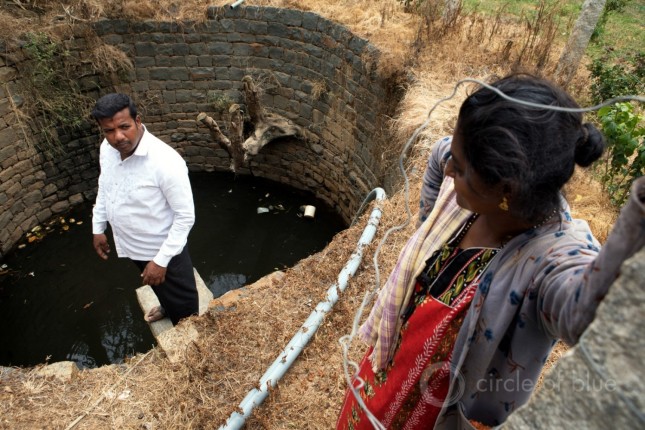
Doula Village lies 55 kilometers (34 miles) northeast of New Delhi on a flat expanse of Uttar Pradesh farmland close to the Hindon River. Until the 1980s Doula Village’s residents, then numbering 7,000, and its farmers and grain merchants, thrived on land that yielded ample harvests of rice, millet, and mung beans. The bounty was irrigated with clean water transported directly from the river, or with the sweet groundwater drawn from shallow wells 7 meters (23 feet) deep.
-
Doris Kaberia on Public-Private Partnerships and Holistic Approaches to Water Management in Kenya
› “You cannot separate water and health,” says Doris Kaberia in this week’s Water Stories podcast. “People need safe drinking water for them to be healthy.” Kaberia works with Millennium Water Alliance, a coalition of international NGOs working on water sanitation and hygiene around the world, where she manages a Kenyan water program.
“You cannot separate water and health,” says Doris Kaberia in this week’s Water Stories podcast. “People need safe drinking water for them to be healthy.” Kaberia works with Millennium Water Alliance, a coalition of international NGOs working on water sanitation and hygiene around the world, where she manages a Kenyan water program. -
Resource Nexus Approaches Can Inform Policy Choices
›Guest Contributor // January 8, 2019 // By Stacy D. VanDeveer, Raimund Bleischwitz & Catalina Spataru
The unabated growth of natural resource consumption raises risks that we will outstrip the capacities of ecosystems and governance institutions. At the same time, to achieve important global goals related to poverty alleviation, public health, equity and economic development such as those embodied in the United Nations Sustainable Development Goals (SDGs), we will simultaneously need more resources and better management of natural resources everywhere.
-
Snow and Ice Melt Patterns Help Predict Water Supply for Major Asian River Basins
›
“For the longest time we thought that water was forever renewable and that it would always be there,” said Gloria Steele, Acting Assistant Administrator for Asia with USAID, at a recent Wilson Center event on water security in High Asia. “We now know that is not the case, and we need to protect it and manage it effectively.”
-
50 Years of Water at Wilson: Rising New Ocean, Endangered Villages, Plastic Pollution (Part 2 of 2)
›
In the Arctic, “a new ocean has emerged and we have to deal with it,” said Mike Sfraga, Director of the Wilson Center’s Global Risk & Resilience Program and Polar Institute at a recent water event celebrating the Wilson Center’s 50th anniversary.
-
50 Years of Water at Wilson: Water, Conflict, and Cooperation (Part 1 of 2)
›
A number of countries across North Africa, the Middle East, into Central and South Asia are “at risk of failure if they can’t get the water equation right,” said Aaron Salzberg of the U.S. Department of State, at a recent Wilson Center event celebrating 50 years of working on water’s connection to conflict and cooperation. The event brought together experts from government, NGOs, and academia for a comprehensive look at the first year of the U.S. Global Water Strategy and new research and practice on water, peace, and conflict. Either now or sometime in the near future, said Salzberg, if fundamentally water insecure countries lacking access to sustainable supplies of safe drinking water and basic sanitation do not address their water problems, they will face increased risk of failure and greater fragility.
-
Sandra Ruckstuhl on Capturing Practical Lessons on Water, Conflict, and Cooperation
›Friday Podcasts // Water Stories (Podcast Series) // December 14, 2018 // By Kathryn Gardner & Truett Sparkman We realized “there was a need for a toolkit on water,” says Sandra Ruckstuhl in this week’s Water Stories podcast, “with a focus of conflict and conflict mitigation, but also peacebuilding.” Ruckstuhl, a consultant for the World Bank who has researched water programs in Yemen and the Middle East, helped the Wilson Center produce USAID’s Water and Conflict toolkit, which documents examples of successful development interventions focused on water and peacebuilding.
We realized “there was a need for a toolkit on water,” says Sandra Ruckstuhl in this week’s Water Stories podcast, “with a focus of conflict and conflict mitigation, but also peacebuilding.” Ruckstuhl, a consultant for the World Bank who has researched water programs in Yemen and the Middle East, helped the Wilson Center produce USAID’s Water and Conflict toolkit, which documents examples of successful development interventions focused on water and peacebuilding.
Showing posts from category water.


 “When we start talking about water in the context of security, we’re immediately drawn to a conversation about conflict. And that’s often framed in terms of scarcity of water and a real zero-sum game around water, where scarcity begets grievances, which beget instability and conflict,” says Ken Conca, Professor at American University’s School of International Service, in this week’s Water Stories podcast. Of the world’s 276 transboundary water basins, fewer than half are governed by an agreement or accord that allocates use of the shared water between countries—and less than a quarter of these accords include all the riparian states in a basin.
“When we start talking about water in the context of security, we’re immediately drawn to a conversation about conflict. And that’s often framed in terms of scarcity of water and a real zero-sum game around water, where scarcity begets grievances, which beget instability and conflict,” says Ken Conca, Professor at American University’s School of International Service, in this week’s Water Stories podcast. Of the world’s 276 transboundary water basins, fewer than half are governed by an agreement or accord that allocates use of the shared water between countries—and less than a quarter of these accords include all the riparian states in a basin.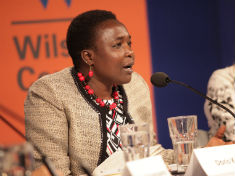 “You cannot separate water and health,” says Doris Kaberia in this week’s Water Stories podcast. “People need safe drinking water for them to be healthy.” Kaberia works with Millennium Water Alliance, a coalition of international NGOs working on water sanitation and hygiene around the world, where she manages a Kenyan water program.
“You cannot separate water and health,” says Doris Kaberia in this week’s Water Stories podcast. “People need safe drinking water for them to be healthy.” Kaberia works with Millennium Water Alliance, a coalition of international NGOs working on water sanitation and hygiene around the world, where she manages a Kenyan water program.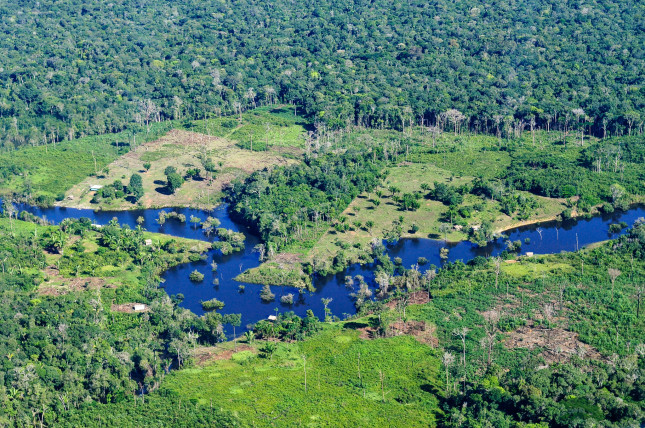
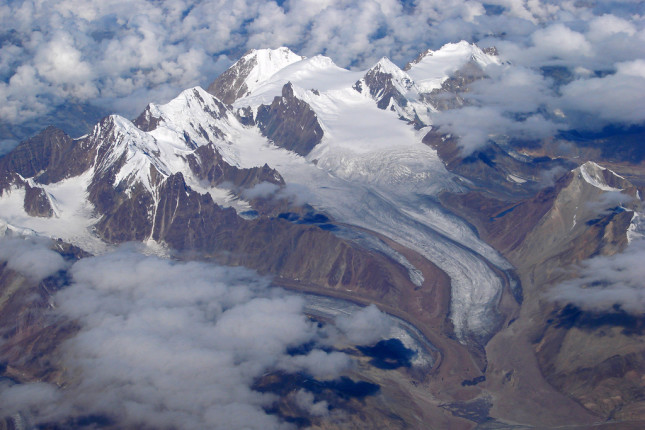
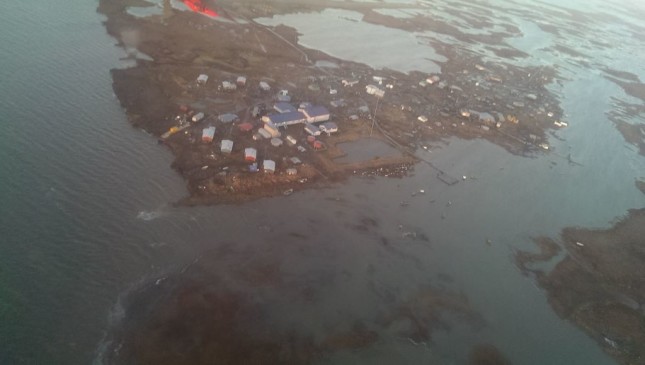
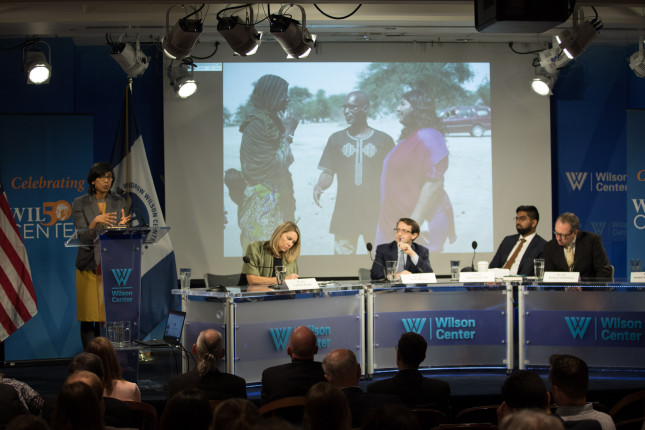
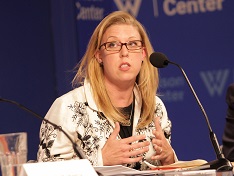 We realized “there was a need for a toolkit on water,” says Sandra Ruckstuhl in this week’s Water Stories podcast, “with a focus of conflict and conflict mitigation, but also peacebuilding.” Ruckstuhl, a consultant for the World Bank who has researched water programs in
We realized “there was a need for a toolkit on water,” says Sandra Ruckstuhl in this week’s Water Stories podcast, “with a focus of conflict and conflict mitigation, but also peacebuilding.” Ruckstuhl, a consultant for the World Bank who has researched water programs in 

